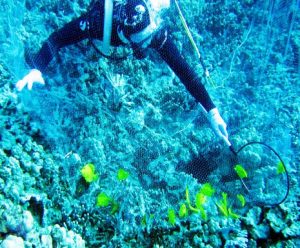State Rejects Pet Industry Environmental Assessments yet Continues to Allow Limitless Aquarium Collection
(HONOLULU) – Native Hawaiian, environmental and wildlife protection groups today urged Hawaii Governor David Ige to immediately halt all extraction of marine animals for aquarium purposes. This comes following a recent comprehensive review of collection reports showing that more than 126,000 reef animals have been taken in the months following the Hawaii Supreme Court order and subsequent First Circuit Court’s October 2017 ruling that all commercial aquarium collection permits are illegal and invalid statewide.
The state records suggest that on average 20,000 reef animals continue to be taken from Hawaii’s reefs every month despite the court ruling. The total number of reef animals potentially trafficked in violation of the court order could conservatively exceed 200,000 animals, not including under and non-reporting, since the October court ruling.
Ironically, the state is allowing this continued mass collection despite its own recent determination, after reviewing the pet industry’s initial environmental assessment, that commercial aquarium collecting significantly impacts our marine environment, and therefore requires a full environmental impact study to comply with the Hawaii Environmental Policy Act.
“It’s outrageous that the state continues to disregard the court’s clear positions that aquarium collecting is subject to Hawaii’s environmental laws, including the most recent Circuit Court ruling that even recreational extraction of less than five animals per day is also subject to environmental and cultural analysis,” said Rene Umberger, executive director of For the Fishes.
“The Ige Administration has given the mainland pet industry the green light to take all the marine life they want, without regard for HEPA and court rulings, and with zero enforcement to ensure rules aren’t being broken,” said Mike Nakachi, native Hawaiian practitioner for Moana Ohana. “Rather than do its job to conserve our sacred reef resources for the Kanaka Maoli and future generations, the Administration continues to go out of its way to cater to private, commercial interests who exploit our people and wildlife.”
Last year Governor Ige justified his veto of a bill that would have phased out aquarium fish permits stating that without the use of fine-mesh nets, which the aquarium fish permits allow, “the worldwide demand for aquarium species could lead to new and more destructive ways of collection.”
“We urge the Governor to immediately intervene against DLNR’s failure to protects Hawaii’s reefs from further collection, including new or possibly more destructive methods used by aquarium collectors,” said Bianca Isaki of KAHEA-The Hawaiian Environmental Alliance.
“The cruel, environmentally harmful and potentially illegal collection of Hawaii’s precious coral reef wildlife must be stopped,” said Keith Dane, Hawaii policy adviser for the Humane Society of the United States. “Governor Ige should step up and put an end to this ongoing destruction of our natural resources for the personal financial gain of a handful of individuals and corporations.”
Background: In September 2017, the Hawaii Supreme Court found that the State’s issuance of commercial permits to collect aquatic life for aquarium purposes was subject to the Hawaii Environmental Policy Act. The following month, the Hawaii Circuit Court determined that all commercial permits to collect aquatic life for aquarium purposes were “illegal and invalid.” In January of 2018 the State determined that all collection of aquatic life for aquarium purposes, regardless of gear or method of capture, in the West Hawaii Regional Fisheries Management Area is prohibited. In April, the Hawaii Circuit Court further voided existing permits for recreational collection of aquatic life for aquarium purposes and determined that this activity is also subject to HEPA. Last week plaintiffs in the litigation were advised that the DLNR was rejecting the pet industry’s proposed DEA’s, requiring a full Environmental Impact Statement on the industry’s impacts.
This appeal does not apply to take under Special Activity Permits which are used by public aquariums, research and educational institutions.
Contact:
Rene Umberger, For the Fishes, rene@forthefishes.org

